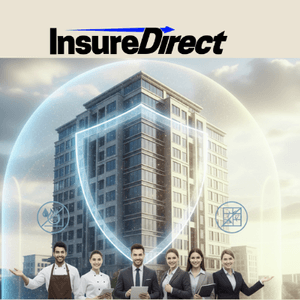I’ll be honest, when I first started my little company, I didn’t even know what commercial property insurance was. Sounded like something only giant corporations needed. But then, a friend told me a horror story: his small cafe burned down after an electrical fault, and without coverage he was basically ruined. That story woke me up.
So, what’s this insurance thing about anyway? It’s basically protection for the stuff your business owns – the building, the chairs, the machines, the stock piled up in the back room. Imagine your office without computers or your warehouse without inventory… scary, right. That’s where property insurance comes in.
Now, in the USA, the risks are all over the place. Hurricanes slap the East Coast, tornados roll through the Midwest, fires eat up parts of California, and thieves never really go out of style anywhere. The Insurance Information Institute said billions get lost every year in damages. If you don’t have insurance, that’s your money flying away. If you do, at least you got backup.
What does it cover? That’s the tricky part. One company might offer a lot, another not so much. Normally though, the basics are:
the building itself, walls, roof, all that
personal property (like furniture, electronics, and whatever equipment you use)
outside signs, fences, maybe landscaping if you’re fancy
sometimes income protection if you can’t operate after damage
I remember reading my first policy and thinking, “Okay, but what’s missing?” Turns out, plenty. Floods and earthquakes usually ain’t included. Employee theft? Nope, you need crime insurance for that. Wear and tear? Forget it. Basically, you get protection from disasters but not from time passing or people being dishonest inside your team.
The money part—what it cost me—kind of depends on a lot of moving pieces. Where your business is matters the most. My buddy in Florida pays way more than I do in Pennsylvania. Building value matters too; bigger warehouse = bigger premiums. And of course, industry. A factory with machines throwing sparks is riskier than a quiet accounting office. Some folks pay $500 a year, others a few thousand. I landed somewhere in the middle. Not too bad, not cheap either.
I’ll tell you how I picked mine. First, I made a list of what my assets are worth. Like, if a tornado ripped through, how much money would it take to replace everything. Second, I checked what risks are more likely where I live. Third, I got like six quotes (yeah, it took time but saved cash). One company excluded flood coverage, another added business interruption automatically. I read every line, even the boring ones. That part saved me later when I realized my outdoor signs weren’t included unless I added them.
There’s one more thing: discounts. I learned that sprinklers, alarms, security systems—all that safety stuff—can shave money off your premium. So, I added a monitored alarm system. Premium dropped about 10%. Worth it.
Let me drop this in plain words: insurance doesn’t just save money, it saves sanity. Without it, every storm forecast makes you sweat. With it, you can focus on work instead of stressing over “what if.” Some landlords and lenders won’t even work with you if you don’t have proof of coverage. So it’s not just a choice; sometimes it’s a rule.
People ask me which companies are good. I can’t say one is the best for everyone, but in the US, names like State Farm, Nationwide, Travelers, The Hartford, Chubb, and Liberty Mutual come up a lot. I personally compared Progressive Commercial with Travelers before settling. Progressive gave me a better bundle deal, so that’s where I landed. But your mileage may vary.
Do I regret buying it? Absolutely not. Think about this: one accident, one storm, one vandal throwing rocks at your windows, and you’re down tens of thousands. No small business I know can eat that loss without pain. Insurance doesn’t make it painless, but at least you’re not bleeding out alone.
If you’re hunting for advice:
Don’t under-insure. If your building’s worth half a million, don’t take a $200k policy thinking it’s “good enough.”
Read exclusions. They hide in fine print like snakes in tall grass.
Bundle when you can. I threw my property and liability together and shaved off a few hundred.
Update your policy once a year. If you bought new equipment or expanded, your old coverage might be too low.
At the end of the day, commercial property insurance isn’t glamorous. Nobody brags at dinner parties about their coverage. But it’s like having a parachute: you don’t care until you’re falling. I’d rather pay now than gamble everything I built.
So yeah—that’s my story, my advice, and my little rant about insurance in America. Protect your business. Seriously, don’t wait for disaster to remind you why it mattered.
Looking for top-notch insurance coverage? InsureDirect has you covered. Getting a home insurance quote is fast, simple, and hassle-free. You can request a quote online or reach out to our corporate office:
InsureDirect.com
Corporate Home Office
618 South Broad Street
Lansdale, Pennsylvania 19446
Email: contact@insuredirect.com
Phone: (800) 807-0762 ext. 602
Protect your home and enjoy peace of mind with reliable insurance from InsureDirect. Because your home deserves the very best.

